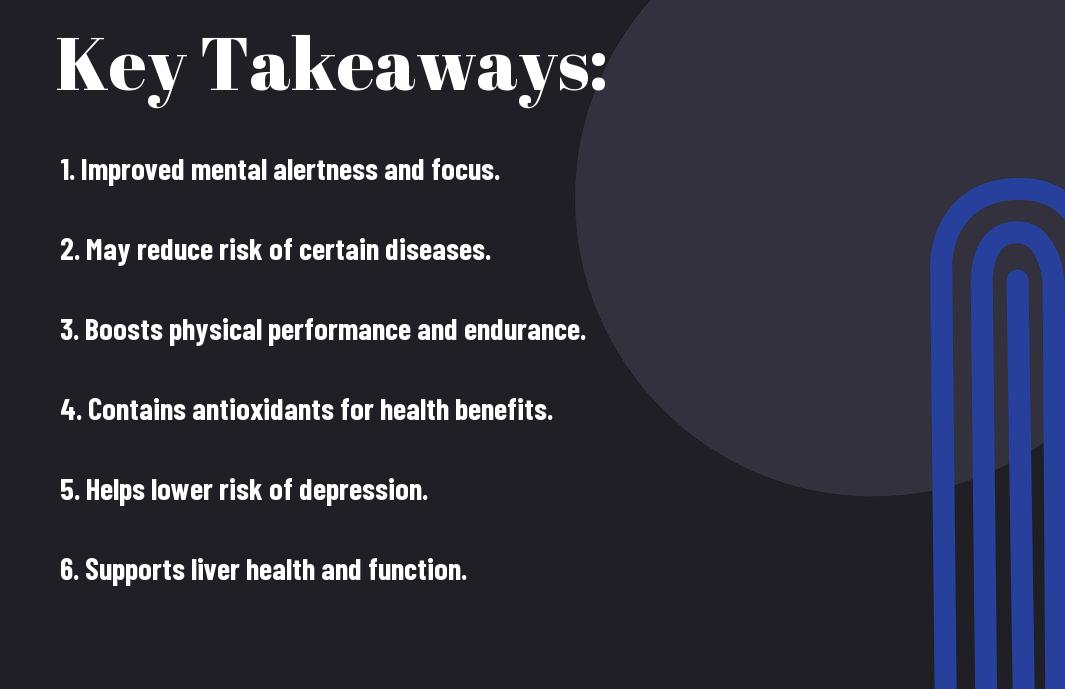Many of us start our day with a steaming cup of coffee, but did you know that this beloved beverage offers more than just a caffeine boost? From improved cognitive function to a lower risk of certain diseases, the health benefits of drinking coffee are vast and impressive. Join us as we explore the science behind why that daily cup of joe may be doing more good for your body than you realize.
Key Takeaways:
- Improved cognitive function: Coffee can enhance focus, alertness, and overall cognitive performance.
- Reduced risk of certain diseases: Regular coffee consumption has been linked to a decreased risk of diseases such as Parkinson’s, Alzheimer’s, and Type 2 diabetes.
- Antioxidant properties: Coffee is rich in antioxidants, which can help protect cells from damage and reduce inflammation in the body.
- Improved physical performance: The caffeine in coffee can increase adrenaline levels, leading to improved physical performance and endurance during exercise.
- Mood enhancement: Coffee consumption has been associated with a reduced risk of depression and improved overall mood.
Overall, incorporating moderate coffee consumption into your daily routine can offer various health benefits beyond just a morning pick-me-up.

Coffee’s Impact on Physical Health
The 9 Health Benefits of Coffee, Based on Science are well-documented, showcasing how this beloved beverage can positively impact your physical health.
Boosting Metabolism and Weight Loss
Coffee’s caffeine content can boost your metabolism, helping your body burn calories more efficiently. Studies have shown that caffeine can increase metabolic rate by up to 11%, making it easier to maintain a healthy weight or even support weight loss efforts.
Lowering Risk of Chronic Diseases
An interesting benefit of coffee is its potential to lower the risk of chronic diseases, such as type 2 diabetes, Alzheimer’s, and Parkinson’s. The antioxidants found in coffee play a key role in reducing inflammation and protecting cells from damage that can lead to these conditions.
Understanding the impact of coffee on chronic diseases highlights its potential as a preventive measure in overall health management. Incorporating coffee into your daily routine could have long-term benefits for your well-being.
Improving Heart Health
Weight management is crucial for heart health, and coffee can indirectly support this by boosting metabolism and aiding in weight control. By promoting a healthy weight, coffee consumption can contribute to reducing the risk of heart disease and related conditions.
This shows that coffee can play a role in improving heart health through its various mechanisms, extending its benefits beyond just a morning pick-me-up.
Coffee’s Effect on Mental Health
You may be surprised to learn that your daily cup of coffee can have a significant impact on your mental health. From reducing stress and anxiety to improving mood and cognitive function, coffee offers a range of benefits for your mind.
Reducing Stress and Anxiety
Reducing stress and anxiety is one of the most well-known benefits of drinking coffee. The caffeine in coffee acts as a natural stimulant, which can help increase dopamine production in the brain. Dopamine is a neurotransmitter that plays a key role in regulating mood and stress levels, making you feel more alert and focused.
Improving Mood and Cognitive Function
An improved mood and enhanced cognitive function are two additional advantages of consuming coffee. Studies have shown that moderate coffee consumption can lead to better mental performance, including increased attention, memory, and overall brain function. So, the next time you need a mental boost, consider reaching for a cup of joe.
Health Tip: To maximize the mental health benefits of coffee, it’s crucial to consume it in moderation. Excessive caffeine intake can lead to jitteriness, insomnia, and other negative side effects, so be mindful of your consumption levels.
Lowering Risk of Depression
Function: Lowering the risk of depression is another compelling reason to incorporate coffee into your daily routine. Research suggests that coffee drinkers have a lower risk of developing depression than non-coffee drinkers. The exact mechanisms behind this correlation are still being studied, but it’s believed that the caffeine and antioxidants in coffee may play a role in protecting against depressive symptoms.
It’s important to note that while coffee can offer mental health benefits, it is not a substitute for professional treatment if you are experiencing severe anxiety, depression, or other mental health concerns. Always consult with a healthcare provider for personalized guidance and support.
Coffee’s Role in Neuroprotection
After numerous studies, it has been found that coffee plays a crucial role in neuroprotection, particularly in preventing neurodegenerative diseases.
Preventing Neurodegenerative Diseases
Neurodegenerative diseases, such as Alzheimer’s and Parkinson’s, are a significant concern as we age. The good news is that the antioxidants and anti-inflammatory properties found in coffee can help protect the brain from these debilitating conditions. Regular coffee consumption has been linked to a reduced risk of developing these diseases, providing a compelling reason to enjoy that morning cup of joe.
Improving Memory and Concentration
To further enhance its neuroprotective benefits, coffee has been shown to improve memory and concentration.
The caffeine in coffee acts as a stimulant for the central nervous system, blocking the inhibitory neurotransmitter adenosine and increasing neuronal firing. This leads to improved cognitive function, including enhanced memory retention and increased focus. So, when you need a mental boost, reaching for a cup of coffee could be the key to improved brain performance.
Enhancing Neuroplasticity
The consumption of coffee has also been associated with enhancing neuroplasticity, the brain’s ability to reorganize and form new neural connections.
Neuroplasticity is crucial for learning, memory, and overall cognitive function. Studies have shown that the compounds in coffee can support this process by promoting the growth of new neurons and increasing synaptic plasticity. This means that your daily coffee habit may not only wake you up but also help your brain adapt and learn more effectively.

Coffee’s Anti-Inflammatory Properties
Many studies have shown that coffee possesses anti-inflammatory properties.
Reducing Inflammation and Oxidative Stress
An important component in coffee, chlorogenic acid, is a potent antioxidant that helps combat inflammation and oxidative stress in the body. This can be beneficial in reducing the risk of chronic diseases linked to inflammation, such as heart disease and diabetes.
Protecting Against Cancer and Other Diseases
For many years, researchers have been studying the potential link between coffee consumption and a decreased risk of certain types of cancer, such as liver and colorectal cancer. Additionally, coffee’s anti-inflammatory properties may also play a role in protecting against neurological diseases like Alzheimer’s and Parkinson’s.
A
Improving Immune Function
With its anti-inflammatory and antioxidant properties, coffee can also help boost immune function. Studies have suggested that moderate coffee consumption can enhance the body’s immune response and reduce the risk of infections.
With other potential health benefits such as improved cognitive function and reduced risk of depression, coffee can be a valuable addition to a healthy lifestyle.

Coffee’s Cardiovascular Benefits
To 9 Reasons Why (the Right Amount of) Coffee Is Good for You, coffee offers several cardiovascular benefits that contribute to overall heart health.
Lowering Blood Pressure and Cholesterol
For those concerned about blood pressure and cholesterol levels, moderate coffee consumption can be beneficial. Studies have shown that coffee may help to lower blood pressure and improve cholesterol levels, particularly in those at risk for heart disease. While excessive coffee intake can have adverse effects, enjoying a few cups a day may contribute to a healthier heart.
Improving Blood Flow and Circulation
Improving blood flow and circulation are vital for cardiovascular health, and coffee may play a role in enhancing these functions. For instance, the caffeine in coffee has been linked to improved endothelial function, which is important for healthy blood vessels. By promoting better blood flow, coffee can potentially reduce the risk of heart problems.
Reducing Risk of Cardiovascular Disease
One of the most significant benefits of coffee for heart health is its potential to reduce the risk of cardiovascular disease. Research suggests that regular, moderate coffee consumption is associated with a lower risk of heart failure, stroke, and other cardiovascular conditions. By incorporating coffee into a balanced diet and lifestyle, individuals may support their heart health and overall well-being.
Circulation is important for a healthy heart, and coffee’s ability to improve blood flow and reduce the risk of cardiovascular disease makes it a beneficial addition to a heart-healthy lifestyle. As with any dietary choice, moderation is key, and consulting with a healthcare provider can help determine the right amount of coffee intake for individual health needs.
Coffee’s Impact on Digestive Health
Improving Gut Health and Bacterial Balance
The consumption of coffee has been linked to improving gut health and maintaining a healthy balance of bacteria in the digestive system. The high levels of antioxidants found in coffee help to reduce inflammation and protect the cells lining the digestive tract.
Studies have shown that coffee can also increase the population of beneficial bacteria in the gut, such as Bifidobacteria and Lactobacilli, which play a crucial role in maintaining digestive health and overall well-being.
Reducing Risk of Certain Cancers
Bacterial Coffee consumption may also reduce the risk of certain cancers, particularly colorectal cancer. The antioxidants present in coffee help to neutralize harmful free radicals that can damage cells and lead to cancer development.
Health Additionally, coffee contains compounds that can inhibit the growth of cancer cells and prevent tumor formation in the digestive system. Regular coffee consumption has been associated with a lower risk of developing colorectal cancer.
Improving Liver Function
Cancers Coffee has been shown to improve liver function and protect against liver diseases, such as liver cirrhosis and liver cancer. The compounds in coffee promote the production of enzymes that aid in detoxification and reduce inflammation in the liver.
Liver Regular consumption of coffee has been linked to a lower risk of liver diseases and may help in maintaining a healthy liver function over time.
To wrap up
Summing up, the health benefits of drinking coffee are numerous and well-documented. From providing a boost in energy and mental alertness to reducing the risk of certain diseases such as Parkinson’s and Alzheimer’s, coffee has shown to be a versatile and beneficial beverage. It’s important, however, to consume it in moderation and be mindful of any adverse effects it may have on individuals with certain health conditions or sensitivities. Overall, incorporating coffee into a balanced diet and lifestyle can contribute positively to one’s well-being.
FAQ
Q: What are the health benefits of drinking coffee?
A: Drinking coffee has been associated with several health benefits, including improved mental alertness, enhanced physical performance, and a lower risk of certain diseases like Parkinson’s, Alzheimer’s, and type 2 diabetes.
Q: Does coffee help with weight loss?
A: Yes, coffee can aid in weight loss by boosting metabolism and increasing fat oxidation. However, it is important to consume it in moderation and without added sugars or high-fat creamers.
Q: Is coffee good for heart health?
A: Studies have shown that moderate coffee consumption may reduce the risk of heart disease and stroke. It is believed that the antioxidants in coffee help improve heart health by reducing inflammation and improving blood vessel function.
Q: Can coffee improve mental performance?
A: Yes, coffee can enhance cognitive function, memory, and focus. The caffeine in coffee blocks an inhibitory neurotransmitter in the brain, leading to a temporary boost in mental alertness and concentration.
Q: Are there any risks associated with drinking coffee?
A: While moderate coffee consumption is generally safe for most people, excessive intake can lead to side effects like insomnia, jitters, and increased heart rate. It is also important to be mindful of added sugars and high-fat additives that can negate the health benefits of coffee.
What are the origins of coffee








